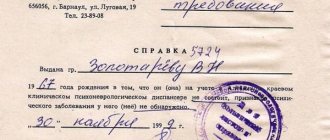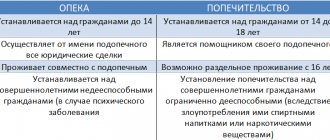Regulatory framework
Current legislation regulates, through regulations at the federal level, aspects of assigning temporary guardianship to grandparents or other relatives, as well as permanent guardianship in the absence of parental care. Legislative acts reflecting these provisions:
- the law in force since April 24, 2008 under number 48, which provides for the rules of law on the tasks and goals of guardianship authorities, the appointment of trustees and guardians on a temporary basis (Article 13), the acquisition of the status of a child without the control of the mother and father, and the termination of guardianship;
- Family Code, which has been in effect since December 29, 1995. It reflects the provisions on establishing guardianship of children who have the status of being without a father or mother.
These legislative norms guide guardianship institutions that resolve issues related to the life of minors.
Guardianship of a grandson
Potential guardian candidates should be aware that the need to establish guardianship of a child arises only in two cases:
- when the minor has a status that proves that he was left without parental supervision (full custody). Such situations include circumstances in which the parents do not participate in his upbringing - they are deprived or limited in their rights, died or were declared dead or missing by the court, are in institutions of the penitentiary system;
- when a minor has no status, this means that his father and mother, due to some circumstances, avoid raising him, but by law they have the right to restore their relationship with their son or daughter at any time.
ATTENTION! In the first case, to remove the duties of a guardian, it is necessary to completely restore the parent’s rights with the participation of departments - the court, the guardianship department, and in the second, it is enough for him to independently establish contact with the minor and take him to be raised by his grandmother or grandfather.
Guardianship of pensioners over 80 years of age
The age of the potential ward does not have any critical significance when registering guardianship. The procedure for registration, the rights and obligations of the parties, as well as other rules of the law are uniform and mandatory regardless of how old the ward is. Thus, guardianship and trusteeship of an elderly person after 80 years of age does not have any significant differences, except for the need for additional care caused by age-related changes and characteristics of care due to the health status of the elderly citizen.
Due to such features, citizens caring for such persons are provided with financial compensation from the state, which will be discussed later.
Registration of guardianship over a grandchild with living parents
To arrange guardianship for a child if his parents are alive, but due to certain life circumstances they cannot raise him, support him, take care of him and provide him with everything necessary, you can contact the guardianship authorities and explain the current situation to specialists. They will talk with the mother or father of the minor, identify their opinion on this issue and the future prospects for the son or daughter to be raised in a biological family.
IMPORTANT! Family policy defines the main direction of guardianship management - children should be raised in the parental family, therefore, it is the mother and father who receive priority over grandparents.
To grandma or grandpa
Relatives such as grandparents are close to the child, since they help parents from birth, are nearby, and pass on valuable life experience. The burden of establishing guardianship often falls on their shoulders if circumstances require it. When identifying a minor who needs to be placed in a family, a specialist from the guardianship department takes into account all available relatives and the opinion of the children themselves.
If the grandparents have the closest contact with the child and meet the requirements for a guardian (taking into account age, financial well-being, good living conditions), the competent authority entrusts guardianship to these candidates.
IMPORTANT! Not every relative is a reliable guardian, so before appointing a legal representative, specialists request information about the applicants from the relevant departments.
With a living mother
Usually relatives want to carry out this procedure, since the parents need to leave temporarily and undergo long-term treatment, which are valid reasons. Unfortunately, they do not always take their obligations to their children responsibly, deliberately avoiding the educational process. Guardianship authorities monitor such situations, so the period of such guardianship does not exceed 1 year , in order to enable the mother and father to take the minor away from relatives. If during this time this issue is not resolved, they have the right to apply to a judicial authority for a court decision to deprive their parents of their rights.
Without depriving parental rights
The guardian-grandmother has the right to fill out an application and provide a package of documents to the government agency where issues regarding the children’s life arrangements are resolved, without depriving the mother and father of parental rights. A positive outcome of this situation is achieved only in the case when the parents plan to take the children into their care after the expiration of the temporary representation, freeing relatives from this responsibility. If they do not plan for such prospects, then they risk facing claims from the guardianship department in court, with a desire to deprive them of maternity and paternity.
We recommend reading: Parenting in the form of foster care
Who can be a guardian for the elderly?
According to Art. 10 of the Federal Law “On Guardianship and Trusteeship”, the requirements for the identity of the guardian are determined by the provisions of the Civil Code. As follows from Part 2 of Art. 35 of the Civil Code, citizens who have reached the age of majority and have full legal capacity can be appointed as such. The law does not provide for any special criteria for those who can obtain guardianship over an elderly person. According to general rules, citizens who have been deprived of parental rights or have a criminal record for crimes against life and health, suffer from diseases that impede guardianship (tuberculosis, oncology, AIDS, HIV, mental disorders, disability) or alcohol and drug addiction cannot provide guardianship to such persons.
At the same time, many are interested in whether a pensioner can be a guardian of an elderly person after 80 years of age, because due to his age, his capabilities are limited.
The fact is that the law does not establish any age restrictions for those who wish to obtain guardianship.
Therefore, a pensioner, if he meets the legal requirements, can also take out guardianship over his relative, friend or even a stranger.
It is noteworthy that the legislator does not tie the opportunity to become a guardian to family ties: anyone can become a guardian, both a relative and a stranger. However, the provisions of Part 5 of Art. 10 of the Federal Law “On Guardianship and Trusteeship”, grandparents, parents and spouses, grandchildren, brothers and sisters are given a preferential opportunity to establish guardianship over their relatives.
The same article determines how many guardians an elderly person can have. As a general rule, each person can have only one guardian, however, if the interests of the person under guardianship require it, several may be appointed. In this case, the protection of the rights and legitimate interests of the ward is carried out by them jointly, although by an act of the competent authorities or an agreement, these responsibilities may be distributed between them.
Responsibilities of a Guardian
The rights and responsibilities of a guardian over an elderly person are determined by the provisions of the Civil Code. According to Art. 36 of the Civil Code, he is obliged to take care of the maintenance of the old man, provide him with care and treatment, and guarantee the protection of rights and interests. Since guardians act as legal representatives of elderly wards, all legally significant actions are performed by them on behalf of the wards, taking into account their interests and opinions and with the prior permission of the competent authorities.
As part of their responsibilities, guardians help restore the ability of the ward to understand the meaning of his actions. If this opportunity has returned, they are required to petition the court to restore legal capacity and terminate guardianship.
Separately, we note that the duties of guardians also include the disposal, preservation and management of the property of the ward. All powers exercised by him must pursue the goals of preserving, increasing and generating income from the property of the ward and for his benefit. Compensatory or other alienation of the property of a warded elderly citizen is impossible without the prior consent of the guardianship authorities.
Read more about the rights and responsibilities of a guardian.
Registration procedure
Federal Law No. 48, which reflects the algorithm for registering temporary guardianship for grandparents and other close relatives of the child, shows a step-by-step sequence of actions, a list of documents, and requirements for guardians. This procedure proceeds as follows:
- the candidate contacts the guardianship institution and receives specialist advice and a list of documents that must be provided to issue the order;
- he collects the information specified in the list, draws up an application requesting the transfer of the minor to his family;
- then, the collected information is submitted to the competent authority, where the data is analyzed (financial condition, previous experience in raising children, characteristics of a candidate from other departments are assessed);
- within 3 days after receiving the documents, the specialist must examine the applicant’s living conditions and conclude whether they correspond to the interests of the children;
- if a citizen satisfies all the requirements, he is given an order, on the basis of which he becomes the legal representative of his grandson or granddaughter.
The point of establishing guardianship is that in the absence of parents, grandparents can be responsible for the child in all instances - healthcare, education, additional employment, social sphere and other areas of public life.
Recommended reading: How to obtain custody of a child?
What is elder care
Guardianship of the elderly is considered to be a form of protection of their rights and interests, the need for which arose as a result of their development of mental illness and receipt of the status of incapacity.
It must be taken into account that such guardianship over an elderly person places a lot of responsibilities on the trustee: he, in particular, becomes the legal representative of his ward, representing and protecting his interests in front of all entities with whom he enters into relations, disposes of his property, takes care of his health and provides all possible care for the person under care. Therefore, a mandatory condition for the appointment of guardianship is the consent of the potential guardian.
Even when the parties live together under guardianship, if they did not exist before, then any legal ties characteristic of biological relatives do not arise. The parties do not acquire any pension, inheritance, property or other rights granted to family members.
List of documents
When contacting the guardianship authority, the applicant is given a list of documents that he must submit for the final resolution of the issue.
These include:
- statement;
- identification information;
- information from place of work and residence (income certificates and characteristics);
- data on passing a medical examination;
- a certificate confirming the absence of a criminal record that qualifies against the health of other people;
- certificates establishing the fact of ownership of real estate;
- a certificate confirming the fact of the child’s birth or his passport;
- information about his medical examination;
- copies of the compulsory medical insurance policy, SNILS;
- information about studying at an educational institution;
- consent of other family members for a minor to live in the family;
- consent to stay with the children’s grandmother;
- a statement from the parents, where they indicate the reason for the guardianship and the period of their absence.
These documents are quite sufficient to formalize guardianship of a child; specialists can assess the legality and feasibility of this procedure.
Sample application
The application for guardianship is a document with the help of which the candidate’s request is expressed, therefore, without it, the data package cannot be considered.
It includes information about:
- identity of the relative (passport data);
- registration and residence address;
- information about the child (last name, first name, patronymic, date of birth);
- the applicant’s request and position regarding the establishment of guardianship;
- additional information about the candidate (what education he has, experience in raising children);
- training as an applicant for caregiver training programs.
The application must be filled out correctly and the information must be reliable; if any facts are concealed, the government agency has the right to consider removing responsibilities from the relative.









